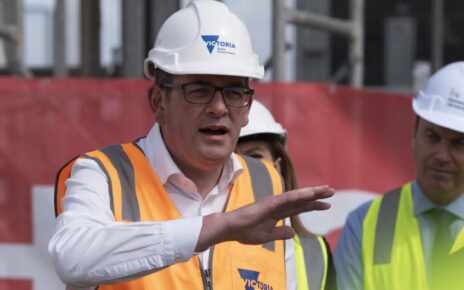Save articles for later
Add articles to your saved list and come back to them any time.
Australian home values are expected to reach a record high within weeks, strengthening the case for the Reserve Bank to lift interest rates for the first time in five months on Melbourne Cup Day.
The latest home value index report from CoreLogic shows national values rose by 0.9 per cent in October. Since the bottom of the trough in January, home values nationally have risen by 7.6 per cent.
Home values in most capital cities have continued to rise from the January trough.Credit: iStock
CoreLogic’s research director Tim Lawless says a further increase of just 0.5 per cent will take national home values to a new record. Barring major economic upsets, that could occur by the middle of November.
“It’s almost a given that the national index will get back to a new record high next month,” he said.
The data strengthens the case for an interest rate rise next week, after RBA governor Michele Bullock recently said the central bank was keeping an eye on home value growth and the effect that will have on household spending.
Reserve Bank assistant governor responsible for financial services, Brad Jones, also used a speech in Sydney on Tuesday to warn the global downward trend in interest rates ahead of the pandemic was probably at an end, with monetary policy to be more volatile as governments and central banks contended with major challenges such as technological change and geopolitical risks.
“There are a number of emerging risks to financial stability that look quite different to those of recent decades and that will likely be with us for some time,” he said.
The RBA began raising interest rates in May last year in its bid to tackle high inflation, lifting the cash rate from a record low of 0.1 per cent and reaching 4.1 per cent in June this year.
Answering questions following a speech at the Commonwealth Bank global markets conference last week, Bullock said the RBA was closely monitoring how households were responding to economic changes.
She said the combination of high inflation and interest rates was helping to slow household spending, taking heat out of the economy, but household wealth was also rising as house prices increased around the country.
Data pointing to a November 7 rate rise
- A larger-than-expected increase in inflation, which rose by 1.2 per cent over the September quarter
- Retail sales rose by a strong 0.9 per cent in September off the back of the new iPhone release, cheaper medicines and good gardening weather
- National home values rose by 0.9 per cent in October, and are expected to reach a new record high in November
“We know from history that rising housing prices tend to result in high consumption, so there’s that as well which is impacting things,” she said.
“So it is a balancing act, and they’re the sorts of things we’ll be looking at, the inflation numbers obviously and our new set of forecasts.”
In some capitals home values have risen by more than 10 per cent since January, rising by 10.9 per cent in Sydney, 10.8 per cent in Perth and 10.2 per cent in Brisbane. Melbourne values by comparison grew by 4 per cent over the same period.
Sydney home values are still 2.2 per cent below the January 2022 peak and Melbourne values are 3.7 per cent below the March 2022 high, while Brisbane home values have reached a new high, after the gains of the last 10 months erased the earlier 8.9 per cent drop.
In Sydney, the median house value is now $1,396,888 and for units is $832,222. In Melbourne, the median house value is $937,736 and unit value is $615,022.
While home values have been consistently rising across most capitals, on a quarterly basis that growth has slowed.
Lawless said home value growth should continue to slow, as home buying activity will struggle to keep up with the surge in listings since winter.
Between June and the end of October, the number of listings has risen by 7.5 per cent nationally. But in Sydney and Melbourne listings have risen by 20 per cent over the same period, and in Canberra, listing numbers are up by 33 per cent.
Consumer sentiment is also low, and Lawless said there’s a close correlation between sentiment and home-buying activity.
“When sentiment is really low like it is at the moment – around GFC and early pandemic lows, and it could move even lower from here – there’s a pretty good chance that we’ll see the volume of sales drop a little bit further as well,” he said.
With Shane Wright
Cut through the noise of federal politics with news, views and expert analysis from Jacqueline Maley. Subscribers can sign up to our weekly Inside Politics newsletter here.
Most Viewed in Politics
From our partners
Source: Read Full Article



